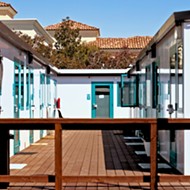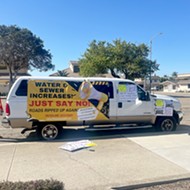[{
"name": "Newsletter Promo",
"id": "NewsletterPromo",
"class": "inlineCenter",
"insertPoint": "4",
"component": "15264767",
"requiredCountToDisplay": "0"
},{
"name": "Ad - Medium Rectangle CC01 - 300x250",
"id": "AdMediumRectangleCC01300x250",
"class": "inlineCenter",
"insertPoint": "8",
"component": "2963441",
"requiredCountToDisplay": "12"
},{
"name": "Ad - Medium Rectangle LC01 - 300x250",
"id": "AdMediumRectangleCC01300x250",
"class": "inlineCenter",
"insertPoint": "18",
"component": "2963441",
"requiredCountToDisplay": "22"
},{
"name": "Ad - Medium Rectangle LC09 - 300x250",
"id": "AdMediumRectangleLC09300x250",
"class": "inlineCenter",
"insertPoint": "28",
"component": "3252660",
"requiredCountToDisplay": "32"
}]
On June 28, 1969, sometime after midnight, a riot broke out in front of the Stonewall Inn—a popular gay bar in New York City's Greenwich Village—between patrons, supporters, and law enforcement. It's regarded as the start of the gay rights movement.
But it wasn't the first act of defiance against the way law enforcement treated the gay community at the time. Similar incidents had taken place in other cities prior to the Stonewall Inn, and Central Coast resident Rick Tibben experienced one of them at a bar called The Patch in Los Angeles.
Tibben said when he returned from the Vietnam War in April 1968, he resolved that he wouldn't be treated as a "fourth-class citizen." He puts himself in this category because Tibben is gay and was a Vietnam vet—both weren't accepted at the time.
Back then, people would get fired from their place of employment or kicked out of their rental property for being gay, so Tibben said he "stayed more in the background."
Despite his reservations, Tibben said he helped out at The Gay Community Services Center in Los Angeles in the early '70s. The center was located in an old Victorian home on Wilshire Boulevard, and Tibben assisted with repairs and essentials such as paper towels, toilet paper, and soap.
On occasion, Tibben would also go to gay bars.
"Police routinely harassed customers and frequently arrested someone usually for a trumped-up charge," he said.
One bar he remembers was called The Patch in the Wilmington neighborhood, an area of Los Angeles. Tibben said he met the owner of The Patch, Lee Glaze, who didn't take kindly to police raids.
According to an article in Life magazine, the Los Angeles Police Department told Glaze that in order to legally stay open, he had to ban drag acts, physical contact, and male-to-male dancing.
"To attempt to keep his patrons safe, Lee Glaze had a 'code' to warn customers when undercover police were in the bar. He played 'God Save the Queen' on the jukebox," Tibben said. "Patrons observed the rules until Glaze gave the all-clear signal."
In August 1968, local law enforcement raided the bar and arrested two men. According to the Life article, when police began demanding to check IDs and making arrests, Glaze jumped on stage and yelled, "It's not a crime to be in a gay bar." In support of the two men and in defiance of police conduct, he said, a small group of bar patrons gathered a large number of flowers and marched to the Harbor Division police station.
"They remained there wandering around the police station until the two men posted bail and were released," Tibben said.
Through The Gay Community Services Center in Los Angeles, Tibben met Rev. Troy Perry, whose boyfriend, Tony Valdez, was one of the men arrested at The Patch that August.
"Rev. Perry was present during the raid on The Patch. He was so incensed that he decided to form a church for all of us outcasts," Tibben said.
One year earlier, the Los Angeles Police Department had raided the Black Cat Tavern in Silver Lake, another gay bar. On New Year's Day, Jan. 1, 1967, the Black Cat was celebrating with a large number of patrons, Tibben said, but many were undercover cops. Uniformed officers, he said, showed up and barricaded the exits while the undercover cops beat up the bar patrons.
"The police lied and said they were the ones attacked. As a Los Angeles city employee, I had personally seen the cops beat the snot out of gay guys with billy clubs for doing nothing, and I mean absolutely nothing," he said. "I reported it to the Office in Charge and was told I was wrong."
After three attempts to report the assaults with no results, Tibben said he gave up.
"A pride rally was organized for the victims of police brutality. Hundreds showed up with pickets at the Black Cat and nearby areas letting it be known that gays were no longer going to stand for such treatment," he said. Δ
Latest in News
Readers also liked…
-

Coast Unified teachers upset over new position's salary and qualifications
Oct 20, 2022 -

SLO police identify alleged driver who hit and killed couple
Dec 22, 2022 -

When the levee breaks: Oceano residents, county officials walk a tightrope of regulations to manage Arroyo Grande Creek, which some say led to the levee's failure in January
May 18, 2023








